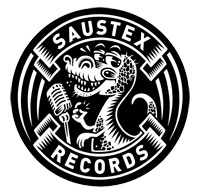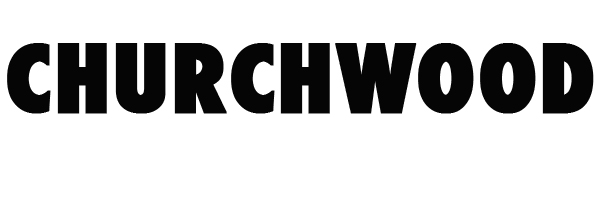
Below is an interview Jeff Smith of Saustex Records conducted with Churchwod prior to the release of their last album...
Churchwood has delivered another volume of condensed brilliance with "3: Trickgnosis". I say without reservation that I think they are the best all-around rock act in Austin at this time, and that's not just because I'd like to sell some records.
Having spent all of my teens and adult life in and around rock bands I must admit I’m a little jaded. That being said, it might come as a bit of a surprise that one of the few acts I’m truly in awe of is Churchwood. I’ve known guitarist Bill Anderson since 1982, and singer Joe Doerr since 1985 (or thereabouts). It’s been a pleasure to watch these guys for three decades now in whatever projects they happened to be in but, after all these years, in Churchwood I believe the two have reached the apex of their respective crafts as musicians and songwriters.
At a time in their lives when most folks who’ve been playing music this long are either walking away or slowing it down these two are seemingly unstoppable, cranking out fresh, visceral and intelligent material at warp speed. With their new album, 3: Trickgnosis, they’ve capped off the rarest of rock’n’roll coups, a trio of impeccable full-length albums. And they are, quite possibly, the three finest consecutive releases by any Austin-based act ever. But, of course, I’m biased and they’re my friends. Still, I don’t throw that kind of praise around lightly, and am doing so even though I’m more than a little jealous of their recordings and intimidated whenever I share a bill with them.
I recently asked Bill and Joe some questions about the new album and their process. Grab your thesaurus and keep Wikipedia on standby... --- Jeff Smith/ Saustex
You guys manage to put out an incredible amount of fresh sounding material. What's the secret there?
JOE: I think our musical prolificacy is a testament to the commitment that each member of Churchwood has to making music. We’re all pretty creative guys. We’re also pretty conscious of wanting to keep the music fresh. It’s no fun to hit the stage as often as we do and plow the same old field over and over again. Beyond that, I personally would have to attribute much of our productivity to Bill. He’s not one to let us rest on our laurels. He insists that we get together at least once a week. If we have down time, he’s sending out mp3s to me and the others via email to keep the creative machine well oiled and stocked with ideas.
BILL: The only hard part is getting a bunch of guys with jobs and families to come to practice and work on something that is not going to make anyone very much money. Once we're all in that room, it's not hard to start making music, especially when we are people who can come up with music that's mostly not right out of the playbook. We all get a thrill out of playing new songs so, especially since we don’t play covers, we have to keep writing songs. Yeah, damn right, I said no covers!
For those already initiated to Churchwood's sound, what do you feel is different about 3: Trickgnosis?
JOE: It may be a bit more conceptual as a record than either Churchwood or 2. I was pretty adamant about the track order on 3: Trickgnosis because I felt the songs
‘read’ like chapters of a cohesive work. It’s also more experimental; we take some musical, lyrical, and thematic risks on this one. You’ll hear a big orchestral bass harmonica on a couple of songs, and I play a keyboard (albeit with a vibraphone setting) on one.
BILL: I always really want us to sound like Churchwood no matter what song we're trying to write or arrange. I hope this record stands with the first two, and that our little forays still sound like us. I guess the formula is to keep off-center blues music as our jumping-off point, and add a few little touches every time we do a record.
Joe, the lyrical subtext of much of 3 seems to be rumination about religion: the braggart snark of "Cain," the mock exorcism tone on "I Spit You Out," the devil re-imagined as creator and overlord of a "quadrinity" in “Triptych”; is that the case, or are you working from scraps and making the picture fit the frame?
JOE: I’ll use any writing technique that suits the moment and/or the song. Some tunes lead me to ideas for lyrics that lend themselves more readily and successfully to the
‘working from scraps’ technique, while others demand less fragmented and ambiguous lyrical treatments. It often depends on the inspiration for a larger concept, one that drives a sequence of songs that wind up as a collection on an album.
While such inspiration can come from a variety of sources: conversations, philosophical conundrums, Yeats’ notion that poetry comes from the “quarrel with ourselves,” more often than not the inspiration for lyrics comes from something I’ve recently read or have been reading. Around the time we started actively writing for3: Trickgnosis, I was revisiting some of the texts I planned to use for a course I’ll be teaching again this fall. The course traces the underground path of dissemination that Gnosticism took from Provence in the south of France following the Albigensian Crusade that condemned it and its offshoots like Catharism as dangerous heresies, and caused its anti-state, anti-war, anti-literalist influence to spread into various other parts of Europe and eventually the rest of the world. The message spread under the radar in the form of poetry and song lyrics that one might think of as championing the dysangelion, or “the bad news.”
It’s important to know that the Gnostics believed, at least metaphorically, that the physical world was created by what they called the Demiurge, a dark manifestation of Sophia (wisdom itself) that was self-conscious and concerned not with the spirit, the soul, or the imagination but only with the physical; the tangible, the empirical, the substantial. The Gnostics didn’t trust the physical at all, believing it to be a cage for the imagination which they felt was a conduit to gnosis (enlightenment) and the means of liberation from the trials of the world; their version of “free your mind and the rest will follow.” Anything they could do to disrupt the physical realm of existence and discredit it and its maker (which they believed to be the God of the Old Testament who was, in their view, demonic) was fair game. The “bad news” they preferred was everything that was considered unwholesome by those who preached the seriously flawed and (for the Gnostics anyway) inaccurate “good news” of the Evangelion (the root word of evangelical, by the way).
So everything is turned upside down: good is the mask that evil wears and evil the mask worn by real goodness. For the Gnostics, grace came in the form of disruption, bad news, because it shook the unenlightened out of their complacency and allowed them to see things for what they truly are, as William Blake put it, “infinite.” To that end, Cain, as Hermann Hesse points out in Demian, is one of the Gnostic heroes, and everyone who knows the dysangelic truth about Cain shares and wears the mark of Cain, which Hesse took to be a metaphorical mark that manifests as nonconformity; all very interesting (to me, anyway).
So at the time we started writing for 3: Trickgnosis, I was re-reading Jung’s Red Book, lots of William Blake, etc., and another book called Atheists: The Origin of the Species by Nick Spencer. In it, Spencer contends that old-guard atheists like Nietzsche used to take the idea of God seriously, and that that’s why they mattered. Nietzsche wasn’t happy about the death of God (for God read ‘the imagination’), as much as he despised Christianity. Rather, he understands how much was lost, how much there is still to lose. Contemporary atheists, or what Spencer calls “evangelical atheists,” aren’t to be taken seriously because not only do they reject metaphysics but their rejection of it and their brand of atheism only exist because of their own or others’ prior metaphysical commitments. In other words, he implies that if religious belief is like believing in the Easter Bunny, shouldn’t new-atheists be a lot less proud of themselves for seeing through it? Spencer quotes John Gray, a classical atheist: “Humanism is not an alternative to religious belief, but rather a degenerate and unwitting version of it.” That struck me as worthy of a lyrical treatment, and “I Spit You Out” was born. I guess the ‘mock exorcism tone’ is accurate to that extent. I also borrowed a bit from William Carlos Williams’ “The Red Wheelbarrow,” which really focuses on the value of the empirical rather than what’s behind the mask of the empirical…so much more depends…
“Triptych” is semi-autobiographical. I am the fourth son of six, but I’ve always admired the gnostic powers that the proverbial seventh son was said to possess. In some traditions, the seventh son has a direct link to Satan. If you’re thinking in terms of the dysangelic, the Devil (really Abraxas who is superior to Lucifer) serves as a conduit to and from gnosis. So I’m really digging your take on the Devil as the creator of a “quadrinity” in Triptych. Who’s behind that triple mask? At any rate, making two more ‘sons’ of myself for a total of three people seemed the easiest way to give birth to a bona fide, albeit schizophrenic, seventh son. And, in the bargain, I made a musical triptych. It seemed fitting for 3: Trickgnosis since I’ve always been fascinated by doubling, tripling, quadrupling, doppelgängers, mirrors, etc. See “Pontiac Flanagan” for more on this.
Also, Joe, your vocals seem to be more character driven than on the previous releases. Is there a conscious effort in that direction or is it simply a matter of becoming comfortable doing that over time?
JOE: The character-driven vocals are there, true. I’m always a little conscious of trying to break away from any preconceived notions about my style, whether musical, personal, writing, or vocal. Keep ‘em guessing without losing faith is a great course of action to prevent any audience from getting bored. I debuted the falsetto on “You Be the Mountain,” on 2, and I think it was well received.
Aside from keeping the audience interested, there’s the question of my own interests to consider. I’ve always admired Tom Waits’ ability to create a number of characters through his vocal treatments, and 3: Trickgnosis seemed like the sort of record that demanded some experimentation along those lines.
As for the vocal treatment on “Triptych,” I wanted that Devil-at-the-crossroads, Robert Johnson-inspired falsetto floating above the driving beat and the vibes in much the same way that Bob Hite uses the falsetto as a counterpoint to the relentless drone of “On the Road Again.” He achieves pretty flawless psychedelia via that approach, the kind that seemed appropriate for “Triptych.”
But there’s another influence I’m mining. When I was about 10, I heard “The Four Horsemen,” by Aphrodite’s Child, for the first time. I was at a friend’s house and we’d raided his older brother’s record collection. I was drawn to that bright red cover with the bold white 666 centered in a black field. It was all very cryptic: alluring and simultaneously repulsive. It reminded me of the Nazi flag, and I was almost afraid to touch it. Then the vinyl hit the turntable, and Demis Roussos’ otherworldly falsetto filled the room…“and when the lamb opened the first seal I saw the first horse, the horseman held a bow.” I felt as though he was speaking directly to me, sharing something essential but forbidden. I was repulsed, terrified, and fascinated all at the same time. Looking back on it now, I realize that my senses were being assaulted by incongruities: the subliminal visuals of the album art had combined with the biblical language of prophecy set to music that was equal parts trance and crossroads. That recording that has haunted me for 40 plus years.
Bill, some of the music on the new album is pretty dark. It feels creepy in the same way that hearing the first Black Sabbath record on the radio did when I was 9 or 10. Is that deliberate or do you start out with a riff that seems innocent enough and dab the evil on from there?
BILL: There is one song that uses a very Sabbath-like riff for sure, and how can one resist doing that? It's inescapable. That flatted fifth is the Devil's Interval, and I have to get it in there at least once per album. But there is no real uniform approach. Sometimes I'll come up with a "prettier" riff and Billysteve will subvert it with a more dissonant harmony, which is all part of the plan.
By the same token the token Churchwood also seems to be folding more funk and jazz into the recipe. Is that conscious?
JOE: Somewhat conscious, yes, though my subconscious probably rolls to a jazz soundtrack. I grew up listening to jazz because my dad is a true jazz aficionado. The house was always filled with Brubeck, Nina Simone, George Shearing, Johnny Mercer, Earl “Fatha” Hines, and a multitude of others. I think what you’re hearing on 3: Trickgnosis is some of that early influence coming full circle. “Hystery Train” is in 5/4 time (just like Paul Desmond’s “Take Five” which was a huge hit for the Dave Brubeck Quartet the year I was born; it was one of my favorites as a kid, and it remains one to this day). The first song I ever danced to, according to family lore before I could even stand up, was Nina Simone’s “Forbidden Fruit.” There’s a lot of that thrown into the Churchwood mix as well.
BILL: You know, you listen to this music all your life and it's there in your head. Between the five of us, we've listened to just about every possible genre one could draw from. I grew up in a home hearing music constantly. Miles Davis and John Coltrane, but also Bob Dylan and the Beatles. Some of the first music I found on my own, besides a bunch of country blues and Chuck Berry, was James Brown, so the funk has been in my brain since I was about 11 or 12. Playing funky music is always risky as a white band, though. It's pretty easy for it to be shit. I hope the funkiness in a few of those songs, especially “Holla Petunia,” sound like a natural part of the song.
Bill has told me that your deal when the band started was that you would be both be fairly autonomous in the writing process; Bill handles music and Joe sings about whatever he wants. Is it as simple as that?
JOE: No, it’s not as simple as that. Though there is plenty of true collaboration with regard to songwriting going on in the band “Weedeye,” for instance, is a song that we wrote in essentially one sitting as a band. Sometimes one or the other of us will contribute a song in its entirety. That’s just a testament to the incredible well of songwriting talent each member of this band can draw from at will. Further testament to Churchwood’s collective musical talent is what we do as a band with songs like this, songs that come to us already fully realized. We “Churchwoodify” them, as we say—we give such songs the Churchwood stamp of approval; hence, the writing credits go to the band rather than to the individual (unless the song was previously published—Bill’s “I Have a Devil in Me” and “Hanged Man,” you’ll notice, for example, have individual writing credits).
That said, individual contributions of complete songs have been going on since the band’s inception. On the first record, for instance, I contributed “Pity the Noose” while Bill contributed “Car Crash.” On Just the Two of Us, I brought “Rickshaw Rattletrap” and “Metanoia” to the table. Billysteve contributed “New Moon” to 2 while I wrote “You Be the Mountain (I’ll Be Mohammad)” and “Keels Be Damned”; Bill, of course, contributed “I Have a Devil in Me.” 3: Trickgnosis is no different: “Hanged Man” is a Bill Anderson composition in its entirely while “Drapetomaniac,” “Hystery Train,” and “Triptych” are mine.
I keep a folder of all of the original mp3s of my contributions because I enjoy revisiting them from time to time so that I can experience them just as they sounded when they were fresh from the well of inspiration. I really dig the rawness of, say, “Metanoia,” with no musical accompaniment at all—just vocals, foot stomping, and hand claps—on the original recording I shared with the band.
Or, more recently, the original mp3 of “Triptych” that I played on my Casio Privia with a vibe setting (the same tone you can hear on the record). I sang “Triptych” into my iPhone as a voice message that I sent to the rest of the band as soon as it was finished. That version is very ethereal, and Bill made a conscious and very successful effort to capture that otherworldly tone when we realized it for the record, when we Churchwoodified that song. It’s incredibly satisfying—for me, anyway—to revisit the original mp3s and play them back-to-back with the studio versions of the songs. Ultimately, whatever the songs’ origins, they all become the product of collaboration. They all become better songs in the end because they’ve passed through the grist mill that is Churchwood.
BILL: Yeah, the trick is making it sound like Churchwood. When we first started the band, I told Joe he could write WHATEVER surreal poetry he wanted, and that I wouldn't mess with his lyrics and we've pretty much stuck with that. Joe is really good at coming up with words to whatever random music we come up with, and the rest of us are pretty good at either putting clothes on the bare bones of an idea, like Metanoia, or tweaking and tweaking a song like Mohammad until we all like to play it. Sometimes, as on Keels Be Damned, I will ask him to change the melody over different chords that don't sound as familiar. On a song like Triptych, where I love Joe's lo-fi iPhone recording, we tried to play parts that wouldn't change the feeling of the original. It's a given that a prolific songwriter like Joe is going to keep coming in with his own great songs, but what the music and approach you ultimately hear is very much a collaboration.
The questions so far have made it seem like the other members are sidemen, which is definitely not the case. Everyone projects a lot of personality in their playing. You guys are definitely more than the sum of your parts...comments?
BILL: Like I was just saying, the music is extremely collaborative, like a bunch of the other bands I've been in. When I recruited these guys for Churchwood, I knew I was getting people that had lots of ideas, the challenge was to get everyone on some kind of same page. Unless I was actually paying people to play my music, I wouldn't presume to tell them exactly what notes to play, maybe at the most I would suggest what NOT to play. But I feel like a creative player has to have some kind of stake in the project, and actually half the fun for me is hearing what the other guys come up with for the songs. Even before I asked Joe to sing with us (and I have a long history of collaborating with Joe that goes back to the mid-‘80s), I had asked Julien if he would play bass. We played well together in Cat Scientist and I figured we would continue on like that, but then he asked if he could play drums, which flummoxed me a bit. He was a really strong bass player, but was really kind of a beginner on drums, so it was a bit of a leap of faith for me. Of course he turned out to be a natural, and he is pretty insistent on not playing the first possible beat that comes to mind. He is as an important part of why we sound the way we do as anybody in the band is. Adam, who I had played with in Speeding Motorcycle, a Daniel Johnston rock opera at Zach Scott, plays bass perfectly with Julien’s drums, and can follow all the twists and turns of whatever Julien or the guitars throw at him. I could see Billysteve was a guitar player who obviously understands and loves the blues but, like me, was far from being a purist and was open to a different approach. I really wanted to try and get away from the whole I-IV-V, lead/rhythm, reliance on chords all the time. I figured he could be a guy that would come up with stuff to play in between. I wanted the guitars to have interlocking parts, which you hear in a lot of music, but not always in the blues (though all over a bunch of classic Howlin’ Wolf songs). And I knew that even though we had the same basic vocabulary, he would come up with stuff I wouldn’t think of, and vice-versa.
Churchwood thumps out some crazy rhythms with intricate guitar interplay and dramatic vocals on top. The stuff out of the studio always sounds great but do you ever hit a brick wall trying to do some of the numbers live?
JOE: I’ll let Bill comment at length on this one, but I will say this: we’re always aware of the presence of the brick wall, but we find ways over, under, or around it because the songs matter to us. We’ve only just begun to perform “I Spit You Out” and “Triptych” live, and we’re pretty satisfied with our progress. Those songs will only get better live; we just have to work out the kinks of reproducing them in a club setting. I’m currently experimenting with ways to mic the bass harmonica so it can be heard when we perform “I Spit You Out” and “Éminence Gris Gris.” And I’m looking for a way to load my little two-octave Korg with a decent vibraphone tone so I can reproduce my signature riff on “Triptych” live without having to haul my 88-key Privia to every gig. Julien has plans to incorporate an effects rig into his set-up and I think that’s a fine idea. The jury’s still out on when and if that will become a reality, but we have big plans to make our live shows even more sonically impressive.
BILL: Damn, that is a pretty sweet capsule description of what we are trying to do: "crazy rhythms with intricate guitar interplay and dramatic vocals on top." Thanks for that. In response to the question, the funny thing is that our albums are probably at least 85% live. Chico Jones, our engineer, will fix little stuff, sometimes a guitar track will need to be replaced, or horns or background vocals added, but most of it is from the first, second, or third take, and on the last album we kept the "scratch" vocals for just about every song. Yes, playing the songs onstage is a different experience. Someone can be playing too loud or not loud enough for the balance, another guy maybe had one drink too many, the monitors can suck. But playing live is energizing in a way that the studio is not. I should also say that I am always pretty committed to making our albums "honest," that is, not doing very much that can't be replicated onstage. I'm not doctrinaire about it, but for this particular band I feel like the arrangements ARE the song. The way we play it is as important to me as the words or melody. So I feel like a lot of the real work - at least the most enjoyable part of it for me - takes place in the practice room, making up parts and arranging them. The studio part makes me impatient, especially since we are always trying to work within a fairly modest budget. I just want to get our songs down on tape! But I have slowly learned from working with these guys that you have to budget in some time for studio creativity on at least a few songs, to keep it interesting, and because Chico and the band members always come up with great ideas.
You also expanded the role of the horn section on the new album; is the plan to make them a permanent feature or is that dictated by time and economics?
BILL: On 3, as on 2, the horns are only there on two songs, but like last time they really helped those two songs kick ass. Like last time, Joe and I had specific ideas for horn arrangements that the players expanded on and improved. Playing in the rock opera at Zach Scott six years ago was the first time I got to play with a real horn section and it was a blast. After adding a horn arrangement to “Mohammad,” we now have five songs that the horn section can play on at shows, and we will probably get their help in arranging another one. Leila Henley, our sax player, is a fantastic musician and just an all-round great person to know, and I've thought about maybe having her more involved from the get-go on songs for the next album. Shane Walden is our trumpet player (I like how I'm calling them "our" horn players), and our original trombonist Nick Warrenchuk moved, damn it, but has been ably replaced by Dillon Buhl. They are all busy people, and so time and economics DOES dictate how often we are able to have them play shows with us. They will be in full effect at our record release at the Continental Club on September 20, though…
I'm guessing you guys have already started on material for 4?
JOE: In a word, yes.
BILL: Since it’s going to be a double album, we’ll have to work twice as hard.
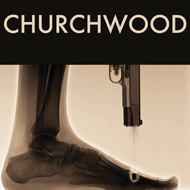
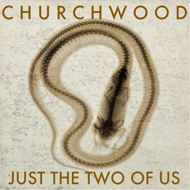
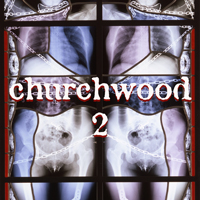
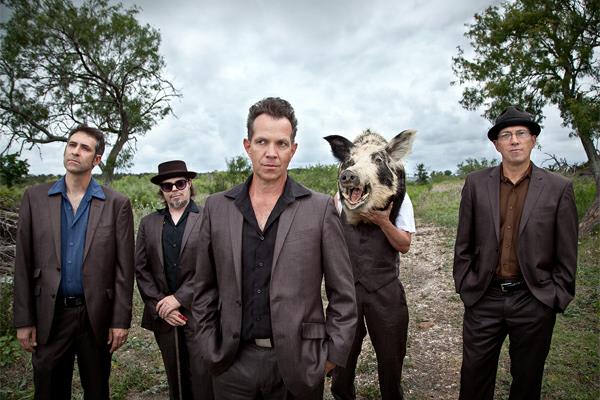
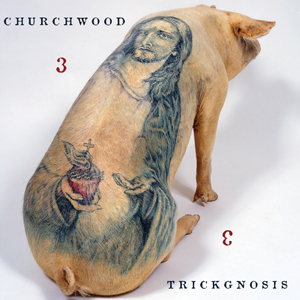
CHURCHWOOD "3: TRICKGNOSIS" CD
$10 + S&H
CHURCHWOOD "3: TRICKGNOSIS" LP ON LTD ED (200 copies) Trickgnotic Vinyl
$14 + S&H
CHURCHWOOD "2" CD
$10 + S&H
CHURCHWOOD "2" LP ON LTD ED (200 copies) Yellow Vinyl
$14 + S&H
CHURCHWOOD
DEBUT ALBUM CD
$10 + S&H
CHURCHWOOD "7" ON LTD ED (100 copies) White Vinyl
$5 + S&H
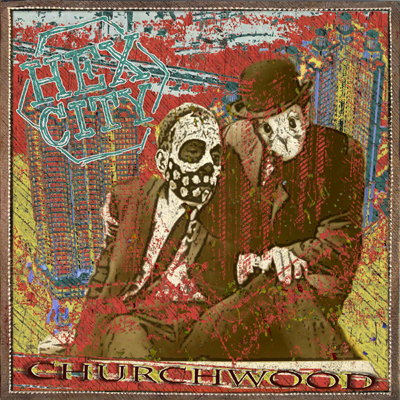
Austin-based experimental/avant-garde blues band Churchwood continue their streak of winning albums with 'Hex City', their fourth full-length release. The new album is slated for release on November 18, 2016. This go-around finds them in a sardonic and playful mood with great new tunes including ‘One Big White Nightmare’,‘Hainted’ and ‘Sag’ as the band weaves a spell of musical voodoo around the tongue twisting, multi-lingual lyrics of Joe Doerr. Veteran critic Michael Corcoran describes the band’s sound as having “a prog-like thickness while staying grounded in roots rock”, while William Michael Smith says Churchwood is “Dense and nasty, literate and mean...”. Churchwood is recommended for those who favor artists such as Captain Beefheart, Nick Cave and Tom Waits who push the lyrical and musical boundaries of the blues form. CD package includes cover art by Jon Langford and 12-page booklet.
CHURCHWOOD
"HEX CITY"
COMPACT DISC
$11 + S&H
